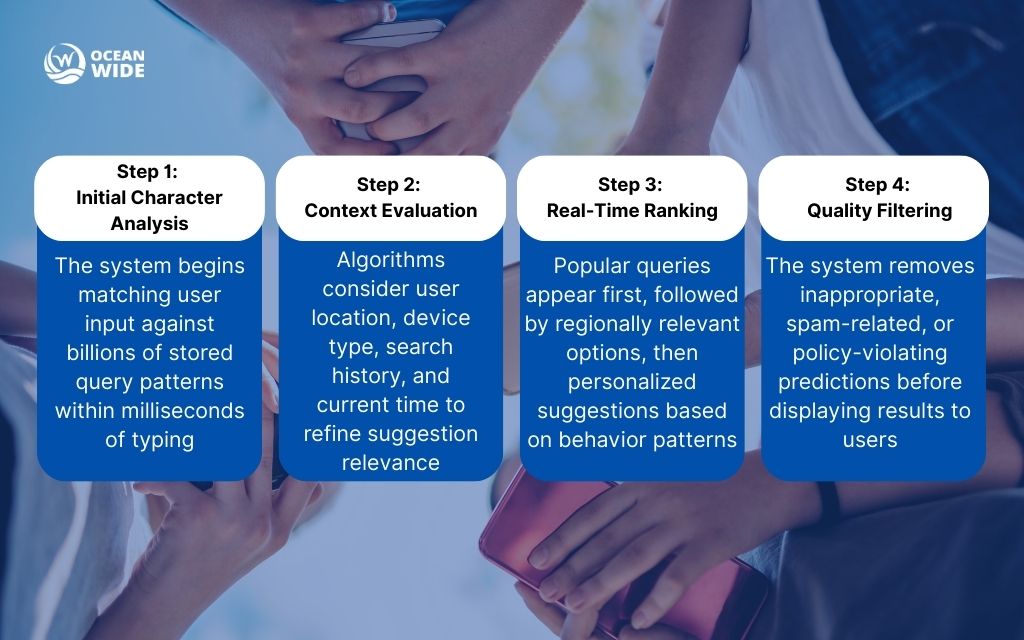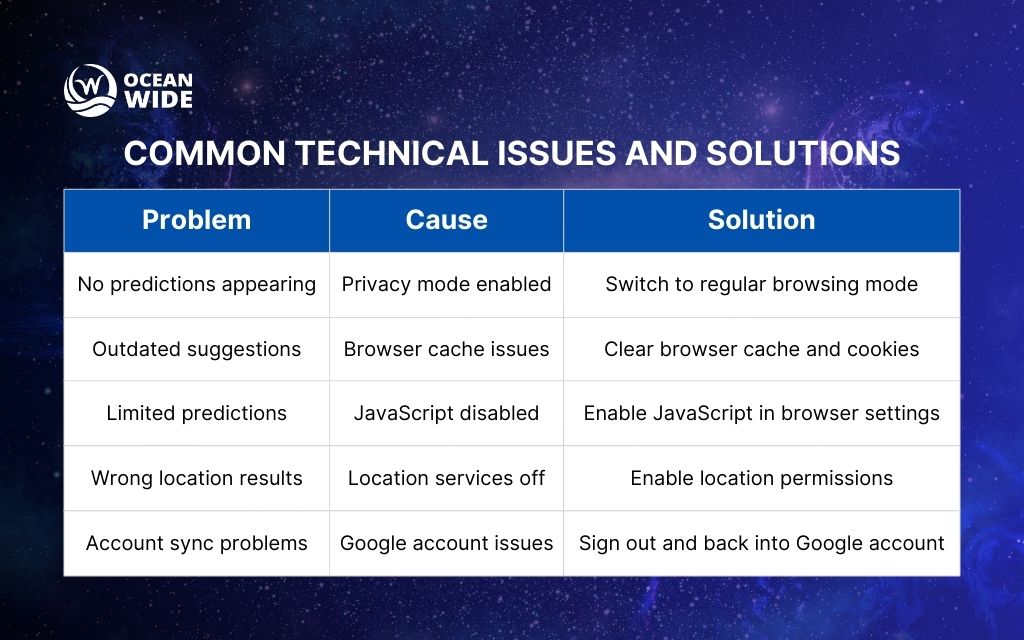Ever wondered how Google seems to read your mind when you start typing a search query? Understanding how google autocomplete predictions work isn’t just fascinating technology – it’s essential knowledge for Colorado business owners who want to dominate local search results.
For startup founders and small business owners across Denver and Colorado, mastering autocomplete insights can transform your digital marketing strategy. These predictive suggestions reveal exactly what your customers are searching for, creating opportunities to optimize content, discover profitable keywords, and stay ahead of competitors.
This comprehensive guide explores the sophisticated technology powering Google’s search predictions and demonstrates practical applications that drive real business growth. You’ll discover how machine learning algorithms process billions of searches, why location matters for Colorado businesses, and actionable strategies to leverage autocomplete data for SEO success.
Whether you’re launching a Denver startup or expanding an established Colorado business, understanding autocomplete mechanics gives you a competitive edge in today’s digital marketplace.
Need expert guidance implementing these strategies? The Ocean Wide specializes in advanced SEO website design solutions for Colorado businesses, helping Denver-area companies transform autocomplete insights into measurable growth.
The technology behind Google autocomplete predictions
Google’s autocomplete system represents one of the most sophisticated prediction technologies in digital marketing. The platform processes massive datasets to deliver relevant suggestions that shape how millions of users discover businesses like yours.

Machine learning algorithms powering search predictions
At its core, Google autocomplete relies on advanced machine learning algorithms that continuously analyze search behavior patterns. These systems process over 8.5 billion searches daily, creating a comprehensive understanding of user intent and preference patterns that inform every prediction.
The algorithms employ natural language processing to decode search context and meaning. When someone types “best pizza,” the system understands they’re likely seeking restaurant recommendations rather than pizza recipes or pizza history. This semantic understanding enables more accurate predictions that match actual user intentions.
Pattern recognition technology identifies trends across massive user behavior datasets. The system recognizes seasonal patterns, trending topics, and emerging search interests, adjusting predictions accordingly. For Colorado businesses, this means understanding when customers search for specific services throughout the year.
Real-time data processing ensures predictions stay current with breaking news, viral trends, and immediate market shifts. This responsiveness helps businesses identify emerging opportunities before competitors recognize changing customer interests.
Key factors influencing autocomplete suggestions
The following factors determine which predictions appear in Google’s autocomplete system:
Search Volume & Popularity
- Queries with higher search frequency receive priority placement
- Popular keywords become more visible to users
- Trending topics gain temporary prediction boosts
Geographic Location Impact
- Colorado users see region-specific suggestions
- Denver-focused businesses appear in local predictions
- Regional terminology influences suggestion relevance
Language & Cultural Context
- Local dialects affect prediction accuracy
- Regional references shape suggestion priority
- Cultural preferences influence keyword weighting
User Behavior Patterns
- Personal search history creates individual variations
- Device type affects prediction algorithms
- Time of day influences suggestion relevance
How Google’s autocomplete algorithm actually works
Understanding the technical mechanics behind autocomplete predictions helps business owners make informed SEO decisions. The system operates through multiple processing stages that transform raw search data into relevant suggestions.

The multi-stage prediction process
Google’s autocomplete system follows a structured approach to generate relevant predictions:
- Step 1: Initial Character Analysis The system begins matching user input against billions of stored query patterns within milliseconds of typing.
- Step 2: Context Evaluation
Algorithms consider user location, device type, search history, and current time to refine suggestion relevance. - Step 3: Real-Time Ranking Popular queries appear first, followed by regionally relevant options, then personalized suggestions based on behavior patterns.
- Step 4: Quality Filtering The system removes inappropriate, spam-related, or policy-violating predictions before displaying results to users.
Entity recognition and semantic search integration
Named entity identification helps algorithms understand specific references within queries. When users search for “Denver restaurants,” the system recognizes “Denver” as a location entity and “restaurants” as a business category, improving prediction accuracy.
Relationship mapping connects related concepts and entities. The system understands connections between businesses, locations, services, and customer needs, enabling more sophisticated prediction logic.
Intent classification categorizes search purposes into informational, navigational, commercial, or transactional queries. This classification helps predict what users actually want to accomplish, improving suggestion relevance.
Semantic analysis goes beyond keyword matching to understand meaning and context. The system interprets user intent even when query phrasing varies, ensuring predictions remain helpful regardless of how customers express their needs.
Business applications of Google autocomplete data
Smart business owners leverage autocomplete predictions as a powerful market research tool. These suggestions reveal customer language patterns, seasonal trends, and emerging opportunities that traditional keyword research might miss.
Keyword research and content strategy development
Mining long-tail keywords from autocomplete suggestions provides direct insight into customer search behavior. These predictions show exactly how potential customers phrase their queries, enabling more targeted content creation.
Understanding search intent becomes clearer through autocomplete analysis. Predictions reveal whether customers seek information, want to make purchases, or need specific services, helping businesses align content with user expectations.
Content gap identification emerges from systematic autocomplete research. When predictions suggest customer interests that your current content doesn’t address, you’ve discovered valuable expansion opportunities.
Competitor analysis through autocomplete reveals market positioning opportunities. Studying predictions related to competitor names or services helps identify underserved market segments or customer pain points.
Local SEO optimization for Colorado businesses
Location-specific autocomplete patterns provide crucial insights for Colorado companies. Denver businesses can analyze how local customers combine geographic terms with service keywords, optimizing content accordingly.
Regional search behavior analysis reveals unique Colorado market characteristics. Seasonal outdoor activity preferences, local event interests, and regional business needs all influence autocomplete predictions.
Local keyword targeting strategies improve when informed by autocomplete data. Understanding how customers search for Denver-area services helps businesses optimize Google My Business profiles, website content, and local citations.
Market trend identification through autocomplete helps Colorado businesses stay ahead of customer demand shifts. Emerging prediction patterns often signal changing customer preferences before they become obvious through other metrics.
Advanced SEO strategies using autocomplete intelligence
Sophisticated businesses transform autocomplete insights into comprehensive SEO strategies that drive measurable results. These approaches go beyond basic keyword research to create competitive advantages.
Competitive analysis through autocomplete insights
Brand mention monitoring in predictions reveals customer perceptions and competitor positioning. When your business name appears in autocomplete suggestions, it indicates growing brand awareness and search demand.
Competitor keyword discovery methods uncover strategies that drive rival success. Analyzing autocomplete suggestions for competitor names reveals services, locations, and customer concerns associated with competing businesses.
Market trend identification through prediction analysis helps businesses anticipate customer demand shifts. Emerging autocomplete patterns often precede broader market changes, providing early competitive advantages.
Customer pain point discovery emerges from question-based autocomplete suggestions. Predictions starting with “why,” “how,” or “what” reveal specific customer concerns that your content can address.
Content optimization based on prediction patterns
Aligning content with popular queries ensures your website appears relevant for actual customer searches. Creating pages that directly answer common autocomplete predictions improves search visibility.
FAQ section development from autocomplete suggestions provides valuable user experience improvements. Questions that appear in predictions make excellent FAQ content that serves both users and search engines.
Topic cluster creation around prediction themes helps establish topical authority. Grouping related autocomplete suggestions into comprehensive content clusters signals expertise to search algorithms.
Seasonal content planning benefits from autocomplete trend analysis. Predictions reveal when customer interest peaks for specific services, enabling strategic content calendar development.
Troubleshooting Google autocomplete predictions not working
When google autocomplete predictions not working properly, it impacts both user research capabilities and SEO strategy development. Understanding common issues helps maintain consistent access to this valuable data.

Common technical issues and solutions
| Problem | Cause | Solution |
| No predictions appearing | Privacy mode enabled | Switch to regular browsing mode |
| Outdated suggestions | Browser cache issues | Clear browser cache and cookies |
| Limited predictions | JavaScript disabled | Enable JavaScript in browser settings |
| Wrong location results | Location services off | Enable location permissions |
| Account sync problems | Google account issues | Sign out and back into Google account |
Business impact of prediction accessibility problems
Loss of keyword research insights occurs when autocomplete malfunctions. Businesses miss opportunities to understand customer search patterns and optimize content accordingly.
Reduced competitive intelligence gathering hampers market analysis. Without access to autocomplete data, companies struggle to identify competitor strategies and market positioning opportunities.
User experience optimization suffers when prediction research becomes unreliable. Understanding customer search behavior requires consistent access to autocomplete insights for effective strategy development.
Missing trend identification prevents early market adaptation. Autocomplete predictions often signal emerging customer interests before they become apparent through other analytics tools.
Success story: Denver startup’s autocomplete-driven SEO growth
A Denver-based health tech startup partnered with The Ocean Wide to leverage autocomplete intelligence for rapid growth. The company struggled with online visibility despite offering innovative wellness solutions.
The Challenge The startup needed to understand customer search behavior in the competitive Denver health market. Traditional keyword research provided generic insights, but they needed specific language patterns their target audience actually used.
The Strategy
Our approach focused on systematic autocomplete analysis across health, wellness, and technology-related queries. We identified unique search patterns among Denver health-conscious consumers that differed from national trends.
The Results Within six months, the startup achieved remarkable growth metrics:
- 150% increase in organic traffic
- Significant improvements in local search rankings
- Higher conversion rates from targeted content
- Enhanced visibility for health-related services
Key Tactics That Drove Success
- Location-based keyword optimization informed by Denver-specific autocomplete patterns
- Strategic content creation addressing customer questions revealed through predictions
- Comprehensive FAQ development based on common autocomplete suggestions
- Seasonal content planning using autocomplete trend analysis
- Competitive gap analysis through prediction research
The success demonstrated how understanding how google autocomplete the search game works can transform business visibility and customer acquisition for Colorado companies.
conclusion: Transform your business with autocomplete intelligence
Understanding how google autocomplete predictions work provides Colorado businesses with powerful competitive advantages in today’s digital marketplace. The sophisticated algorithms processing billions of searches daily create unprecedented opportunities for companies that know how to interpret and act on prediction data.
From machine learning algorithms to entity recognition systems, autocomplete technology reveals customer search patterns, seasonal trends, and market opportunities that traditional research methods often miss. Denver startups and established Colorado businesses can leverage these insights for strategic keyword research, content optimization, and local SEO success.
The practical applications extend beyond basic SEO tactics. Smart businesses use autocomplete intelligence for competitive analysis, customer pain point discovery, and trend identification that drives sustainable growth.
Ready to transform your Colorado business’s search performance? The Ocean Wide combines deep technical expertise with local market knowledge to deliver measurable results through advanced SEO strategies and autocomplete optimization.
Our Web design Colorado-based team specializes in helping startups and small businesses navigate the complexities of modern search algorithms. We transform autocomplete insights into comprehensive digital marketing strategies that drive real business growth.
Don’t let your competitors gain the advantage. Contact The Ocean Wide today to discover how autocomplete intelligence can revolutionize your business’s online visibility and customer acquisition strategy.
FAQs about How Google autocomplete predictions work
Why should Denver businesses care about Google autocomplete predictions?
Autocomplete influences 40% of user search behavior, making it crucial for local businesses. The Ocean Wide helps Colorado businesses leverage these insights for measurable SEO growth and improved local search visibility.
How does location affect autocomplete suggestions for Colorado users?
Google prioritizes geographic relevance, showing Colorado users region-specific predictions and Denver-focused business suggestions. The Ocean Wide specializes in location-aware SEO strategies that capitalize on these patterns.
What should I do if Google autocomplete predictions aren’t working?
Clear your browser cache, enable location services, and try incognito mode for unbiased research. For persistent issues or advanced strategy development, The Ocean Wide provides expert consultation for Colorado businesses.
How can small businesses use autocomplete data for content marketing?
Analyze predictions to identify customer questions, seasonal trends, and pain points. This creates targeted content that matches actual search behavior. The Ocean Wide transforms autocomplete intelligence into comprehensive content strategies.
Does Google autocomplete work the same across all devices?
While core algorithms remain consistent, predictions vary between desktop, mobile, and voice search due to different user behaviors. The Ocean Wide ensures your Colorado business captures opportunities across all platforms and devices.
